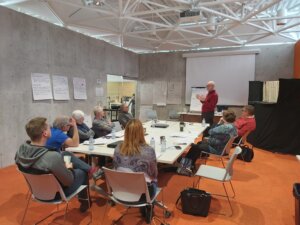Author: Peter Cantelon, Executive Director
Fragile. Self-centered. Unrealistic. Just some of the criticism leveled at Generation Z.
For those of you not keeping track Generation Z are the people born between the mid-90s to early 2010s. They are generally the children of Generation X (my generation).
Between Gen X and Gen Z are the Millennials (aka Gen Y). This group is similar in some ways to Gen X due to their late Boomer parentage but it remains to be seen what their children will be like.
What we do know is that those in Gen Z often annoy the heck out of Boomers (those born between 1946-1964) and those who style themselves after the Boomer generation…hence the criticism you sometimes see.
But here’s the thing, Gen Z is, in part, a product of the parenting style of Gen X and this style was influenced by and in many cases, opposite to the Boomer style they were subjected to.
What does this have to do with the non-profit sector, you ask? Well, quite a bit it turns out. We have often talked about the value of communication in every sector whether it is between staff and clients, staff and one-another and staff and boards. Communication is one of the foundational keys to success.
It is critical to understand generational differences in the effort to ensure good communication in your non-profit and with your client base. Generational differences often equate to different expectations, different approaches, different metaphors etc. Without a sound grasp on these differences conflict can rise up and it becomes harder to implement and deliver on your goals.
I am a manager in a non-profit but I am also, in part, the product of my generation. Growing up Gen X these are the kinds of things we heard from Boomers between a lot of racist and homophobic conversation and jokes:
“Stop crying or I’ll give you something to cry about.”
“Suck it up buttercup…your life is so much easier than mine was.”
“Awww you fell down and skinned your knee? When I was your age my friends used to tie me to a pole and throw rocks at me every day.”
“Life sucks and is hard. I only had one pair of shoes I had to share with my 13 brothers for 10 years. Get over it.”
“Get a job…you don’t have to like it.”
“Take what you’ve been given and be grateful you got something at all.”
You get the idea. Boomers were “tough.” They didn’t like to hear you complain about anything and they really wanted you to know how much harder they had it than you. They were, after all, the children of “the greatest generation.”
As Gen X grew up hearing this we internalized a lot of it and just tried to fly under the radar. As parents however we took a different approach with our kids. We decided that just because we might have had it rough didn’t mean our kids were required to suffer as well.
We told our Gen Z kids they were the most valuable things anywhere. We told them never to settle. We told them to seek out happiness. We told them they deserved the best. We told them they could be whatever they wanted to be. We told them they could change the world. We told them to be better than us…and you know what – they believed us.
Now what we are seeing in Gen Z are people like Greta Thunberg, Zendaya, Mala Yousafzai, David Hogg, Millie Bobby Brown, Billie Eilish, Amanda Gorman and more.
Loud, strong-willed, unapologetic, powerful, compassionate, advocacy oriented individuals who are the tip of the iceberg of a generation that will plow through this world like a force of nature and I, for one, couldn’t be prouder watching them.
This is a generation enacting many of the dreams embedded in them by their parents, who often never felt empowered to do it themselves.
Boomers are a big part of organization management and boards in non-profits (and for profits). The youngest Boomers are 59 years old this year. That means we are likely going to see a large number of them retiring in the next five to six years.
With this in mind it is critical to understand and prepare for the reality that Gen x, Millennials and Gen Z will be taking over the narrative soon (Gen Z is already a long way there).

It seems likely that over the next 10 to 15 years Boomers will still make up a large portion of board membership. This is where communication efforts and work toward mutual understanding really need to ramp up to ensure a conflict free environment.
In the meantime Gen Z doesn’t really pay much attention to the haters…they have been looking forward and are focused on fighting for climate, building a more equal and diverse society, and refusing to allow people to shout them down and dismiss them.
If what we have seen so far is a sign of things to come than strap yourselves in and hold on tight, Gen Z is going to transform everything and as non-profits or leaders in the space we need to listen carefully and take time to understand where these warriors are coming from.